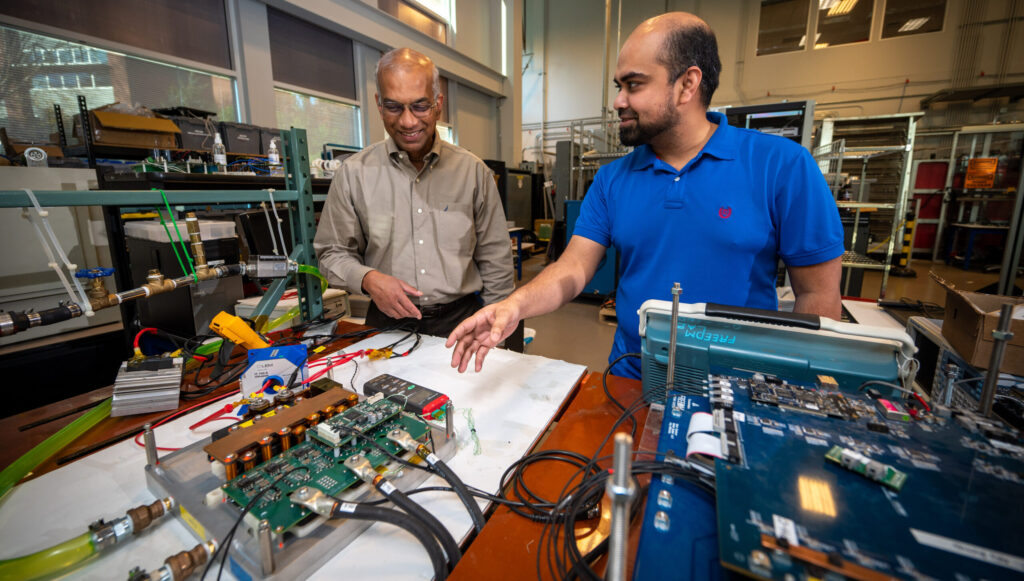Master of Science in Electric Power Systems Engineering

Program Overview
The Master of Science in Electric Power Systems Engineering (MSEPSE) distance education program is designed for professionals with an engineering background to study and practice with electric power engineering tools and methods and who seek the necessary retraining to change careers. 30 credit hours. No thesis required. No GRE scores required.
Admission Requirements
Students need to apply to the Electric Power Systems Engineering-Distance Track-MS in the Department of Electrical and Computer Engineering. The application is entered through the Graduate School site.
It is preferable to seek admission to the MSEPSE program as soon as possible to ensure integration into the advising process. Non-thesis MS students are advised by the MSEPSE Program Director. A person does not have to be admitted to a degree program to enroll in an online credit course. Prior to applying to Graduate School, a qualified individual may enroll in Engineering Online courses as a Non-Degree Studies (NDS) student. The NDS classification is designed for individuals who wish to undertake academic work but who are not currently admitted to a degree program. If the student is admitted to the MSEPSE program, a maximum of twelve hours of graduate-level transfer and NDS credits (B or better in each course) may apply toward the 30 credit-hour degree requirement.
The minimum requirements for admission to the graduate degree program in Electric Power Engineering are as follows:
- A bachelor’s degree from an accredited college or university in electrical engineering.
- An overall GPA of at least 3.00/4.00.
- Statement of Purpose – a statement about your academic career, research, and career goals.
- Three strong recommendations from persons able to comment on the applicant’s qualification for graduate study.
- Students who do not have a bachelor’s degree from an accredited college or university in electrical engineering must satisfy the requirements listed at the MSEPSE graduate program website.
The distance education MSEPSE degree program is limited to those individuals who work or reside in the United States and to United States military personnel serving overseas. The Graduate School requires that all international applicants take the TOEFL or IELTS examination unless they have completed one year of study at a university in the United States. The exam must have been taken within 24 months of your anticipated date of entry.
Degree Requirements
Successful completion of 30 credit hours in courses as follows:
- 15 credit hours of Core Courses
- 3 Credit hours from either ECE 534 or ECE 587
- 12 credit hours of Electives
- Students must maintain a minimum 3.0 out of 4.0 cumulative GPA.
- All requirements for the degree must be completed within three years of enrolling in the first course appearing on the NC State graduate transcript.
- Admitted students must comply with the Graduate School regulations for continuous enrollment or must request a leave of absence not to exceed two semesters.
Find out more about the degree requirements.
Course Registration
Distance-track students register for online courses through Engineering Online. Those who wish to take only a few courses and not pursue a degree, do not need to apply for formal program admission to NC State University. However, students who wish to earn the MSEPSE degree must formally apply for admission to the Graduate School.
To register for an Engineering Online course, complete the registration form on the Engineering Online website. Students cannot register through the University MyPack Portal system for Engineering Online courses.
Courses for the Graduate Plan of Work are selected with the concurrence of the student’s advisor. MSEPSE students are advised by the MSEPSE Program Director.
Course Offerings
A list of distance education courses available for each semester can be found on the Engineering Online website. Full-time employed individuals can only enroll in two online courses per semester. It is highly recommended that new students enroll in only one online course during their first semester.
Course Logistics
Online courses are the same as on-campus courses in terms of content, requirements and academic rigor. On-campus class lectures are captured, digitized and placed on the Internet for distance students to access at any time and from any location. Students must, however, follow the on-campus class schedule in terms of submitting homework and taking exams. Course assignments, lecture notes, and handouts are made available to distance students on the course website. All in-class exams must be proctored.
Contact Information
- For more information about the MSEPSE degree program available online, consult the MSEPSE website or contact:
Dr. Mesut Baran
Program Director
Electrical & Computer Engineering
Keystone Science Center
Telephone: 919.515.5081
Email: baran@ncsu.edu
Program website: https://www.ece.ncsu.edu/grad/masters/epse - For more information about the registration process, course offerings and course logistics, contact:
Dr. Linda Krute, Director of Distance Education Programs
College of Engineering
Telephone: 919.515.5440
Email: linda_krute@ncsu.edu
Engineering Online website: https://engineeringonline.ncsu.edu